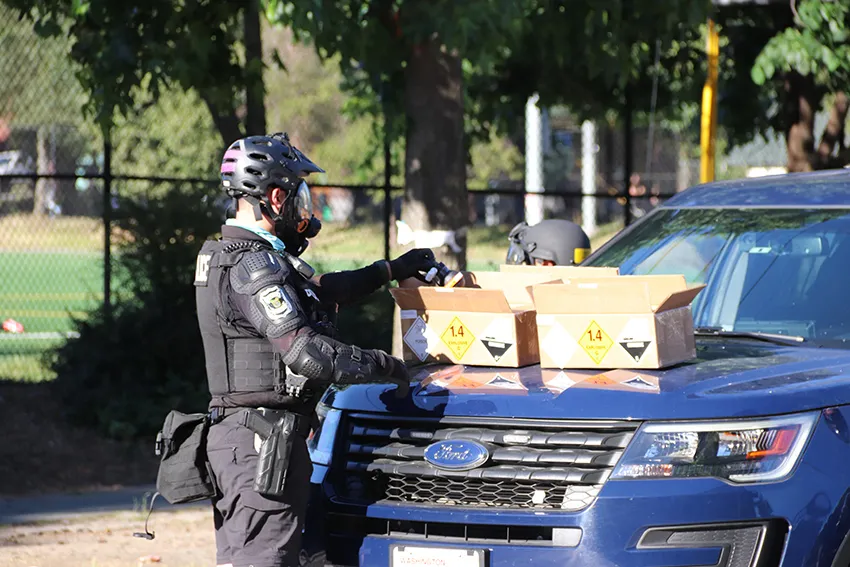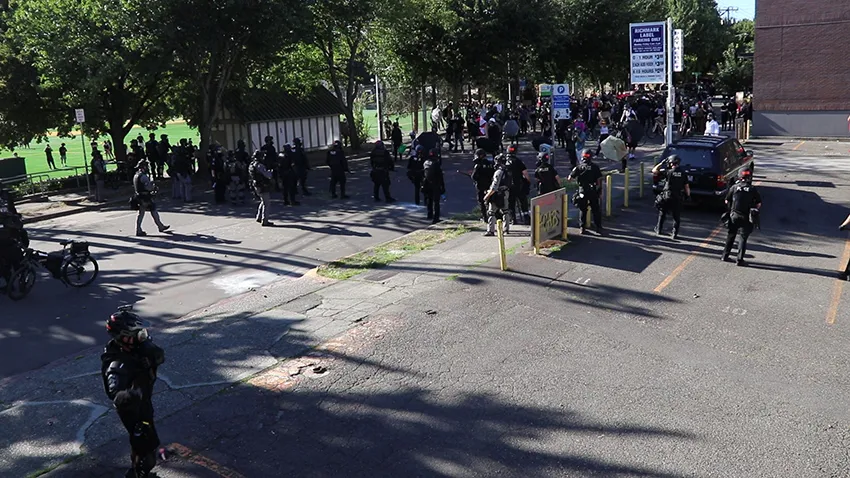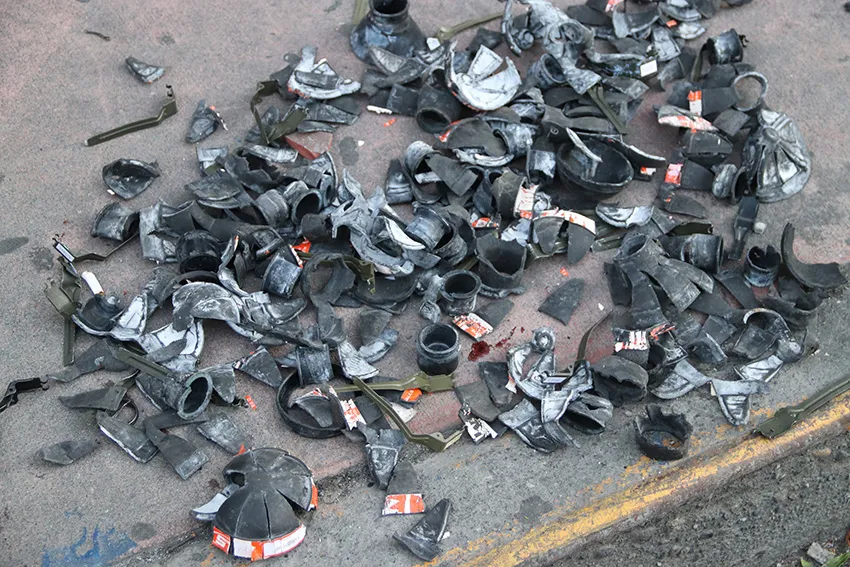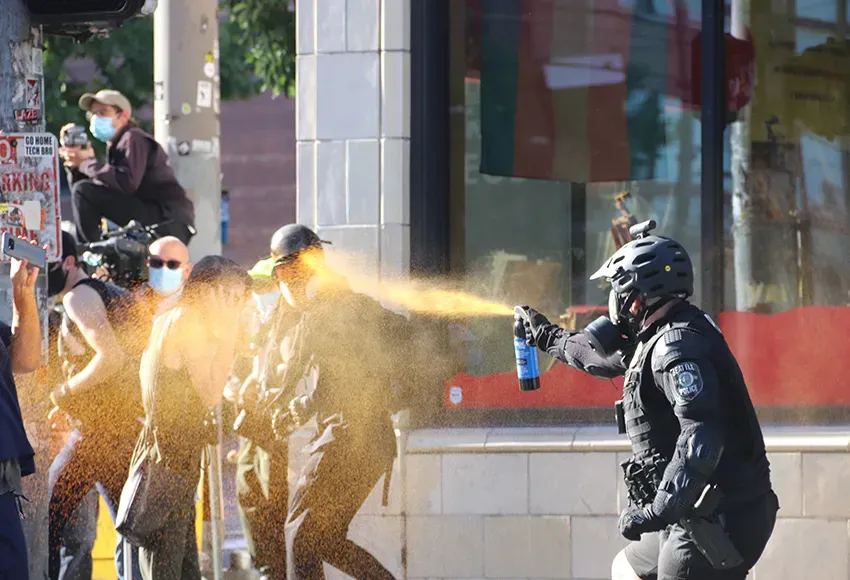King County Superior Court has approved a $10 million settlement in a lawsuit brought by 50 protesters and journalists over the Seattle Police Department's use of excessive force in summer of 2020, in the aftermath of the police killing of George Floyd in Minneapolis.
Among the plaintiffs was former SGN managing editor and current contributing writer Renee Raketty, who sustained serious injury, including permanent hearing loss in her right ear after an SPD officer threw a blast ball at her.
The announcement brings to a conclusion court proceedings that have been in progress for over three years.
Along with the monetary payouts, the plaintiffs asked the City for certain nonmonetary provisions aimed at restoring trust in Seattle's leadership. These include ordering the City to make a full accounting of the changes that have occurred as a result of the protests.
"Our community will be enriched by knowing what changes have occurred through an itemized list, and we will ensure that the City provides documenting evidence of these changes," said Raketty.
The plaintiffs originally aimed to reverse December's removal of the BLM Garden at Cal Anderson Park. City attorneys agreed to the proposal Friday, but the garden's restoration has since met with refusal on the part of City leaders. The revised settlement omits the language concerning the BLM Memorial Garden.
"We thought everybody was on board," said Raketty. "It appears that the City of Seattle has gone back on its word and is now refusing the language in the settlement that would [have ensured] that the
Black Lives Matter Memorial Garden [be] restored."

Lack of communication and indiscriminate use of force
"Being a journalist, I was only interested in the aspects related to informing the citizenry about what was happening in our community," said Raketty, who observed the events as a reporter, not as a participant.
"Originally these protests began downtown but quickly escalated to Capitol Hill," she said. In the middle of this growing unrest, Raketty retreated to a fire escape on 11th Avenue and Pine Street after falling back into police lines, which is a standard practice for journalists.
Overwhelmed by the events as protesters and police clashed around 11th Avenue, she watched a bicycle officer park, approach her, and throw a blast ball in her direction. Raketty recorded the incident with her camera, with the recording giving out just prior to the blast as she braced for the explosion.

Raketty posted the video to her Facebook page and participated in the investigation of a complaint filed with the Office of Police Accountability. The OPA, when examining the video, found it to be inconclusive, as it could not tell what happened immediately prior to the recording.
Raketty argues that the video clearly shows the officer pulling the pin from the munition, counter to his testimony that he had to find a safe place to detonate it after the pin was already removed.
Raketty attributes the escalation to the SPD's lack of communication with the protesters and its crowd-control methods: using chemical weapons and projectiles contrary to official policy and the recommendations of experts. "[The SPD's] lack of communication and use of indiscriminate force compounded the problem," she said.
"Even today police forces are looking at what happened in Seattle and changing their policies, because they don't want similar things happening in their jurisdictions."
Testimony during deposition for the lawsuit included an analysis by crowd-control expert Clifford Stott, PhD, who was previously hired by Seattle's Office of Inspector General in the early days of the George Floyd protests. Stott's testimony faulted the SPD for failing to attempt to de-escalate, mischaracterizing a peaceful protest as a "riot," being speedy in its use of force, using force indiscriminately against peaceful and nonpeaceful protesters alike, and the use of aggressive tactics that contributed to crowd violence.
The City's attorneys successfully filed to have Stott's testimony excluded from evidence during trial, but the video and court documents containing his sworn deposition are available on the plaintiffs' attorney's website (https://www.stritmatter.com/results/black-lives-matter-injured-protestors-lawsuit/professor-clifford-stott-ph-d).

In the immediate aftermath of the July 25, 2020, unrest, the American Civil Liberties Union of Washington filed a motion in federal court to have the Seattle Police Department held in contempt for violating a June 2020 ruling forbidding it from using chemical weapons and projectiles. Raketty and other co-plaintiffs filed their class-action lawsuit later in the year.
The end of a difficult trial
The protests of 2020 represent a unique chapter in both local Seattle and national history, representing a flashpoint in the long-held tension between residents of Seattle and their local government over issues felt deeply nationwide.
"I feel like this will be a moment in Seattle's history that we will all look back on," said Raketty. "I hope that the story will be how we grew as a city through this whole ordeal, how changes have been made that result in a better functioning city government.
"This has been a long and traumatizing process for many of us who will never be the same, not only from the protest but also from the litigation and the extent the City went to defend [itself]."
Raketty expressed gratitude for the plaintiffs' attorneys at the Stritmatter Firm, who represented some of the plaintiffs pro bono. She credits them for providing profound, compassionate support to the plaintiffs and providing excellent guidance.
In the end, Raketty regrets nothing of her time or work as a journalist. Taking clear pride in her role informing the Seattle community, she told the SGN, "It's totally been an honor and a privilege to [serve] the Seattle community as a journalist, providing insight into what was happening at various levels and what was occurring in the streets."


